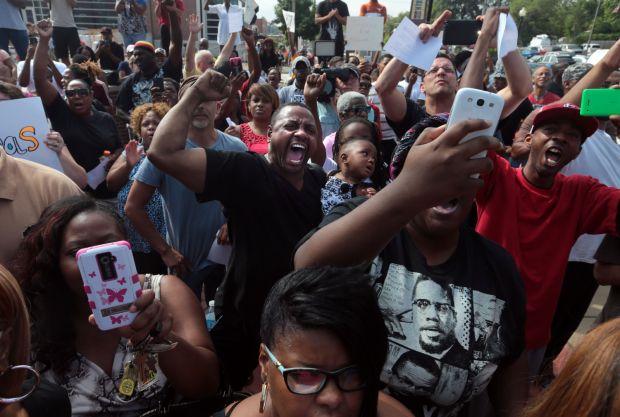And so at one moment on that cloudy, damp, and rather cool March day, the day after her 29th birthday, she knew who they said she was, an accomplished young woman, wife and mother, and brilliant, they called her. How does she do it all? Yes, with bipolar disorder that she’d endured for over twelve years, who was right then having a really bad episode, but still one whole person, who could predict what would happen next in a logical fashion. Intelligence evidenced by high scores on the law school admissions exam. Admitted into one of the top three universities in the country. Confident, self-assured, determined. In one moment she knew things were bad, awful, interminable in that moment but the moment, even if it lasted for weeks, was temporary, and she could handle temporary as she’d handled temporary before. Because she had to do this.
But inexplicably in the next moment a separation occurred and she was not one anymore and what was once temporary was then permanent. She’d heard of this before. She’d seen seven therapists in the past twelve years. Some of them helpful, many of them not. One whose wife died, one who was a student, one who worked at the university, even one who was pregnant at the same time she was, but in twelve years, never…They’d all asked, when she’d been very low, Nana, any suicidal thoughts? And, yes, she’d thought about suicide, and, yes, she’d thought about dying. In an abstract way, she thought about who’d come to her funeral and how hard would her mother cry, or what might happen if she stepped in front of the bus instead of getting on it. How would her bones crush and would she die instantly or would she feel pain? But she always came back to herself and her flesh and she’d touch herself and she’d be there alive. Those were just thoughts, nothing more.
But the thoughts that day were of self-inflicted death and they were real, not of her imagination. She felt death from the inside, cold and hard and permanent as it seeped outward. She saw the plan as it emerged in her mind and it was so easy, so alluring, so neat. Much simpler than when she was in the car that morning, as she drove the kids to day care. Then she thought about swerving into incoming traffic but she didn’t want to hurt anyone else or hitting a tree but they all looked too puny to do the job well. The visual of the pills was clear and direct, nothing to work out, nothing to decide. Just lie down and die. It was a picture of justice, an answer to the problem of her and her badness.
“Just do it.” She heard that voice clearly. Her voice saying, Just Do It. She was saying things she never heard herself say, and that voice was frightening.
Another voice, her motherly, sensible, rational, together, voice said, “Call someone.” By instinct, like a child who can rattle off the phone number of a neighbor to call in the event of an emergency, she picked up the phone and pressed call. Sorry I can’t come… she hung up, and pressed call again, this time to her husband at work. It rang and rang and rang and before she even heard the rejection of You’ve reached, she hung up. Her hand shook and then her arm and within seconds her whole body was shivering. She looked over her shoulder, and her own body moving made her think that other things were moving in the room. She saw the plan again, and felt her body walking up the stairs, toward the bathroom, toward the medicine cabinet. Sertraline, Cymbalta, Topamax, Geodon, Lithium, Triliptal, Lunesta, Ambien, Paxil, antidepressants, anti-psychotics, sleeping pills, hundreds of multi-colored tablets, oblong, circular, square, pills that she took to try halt and prevent the episodes, to stay steady, to achieve a state of equanimity. So many pills; one would never know that as a child she couldn’t take pills unless her Daddy crushed them up and mixed them in applesauce. For a moment she stood there and in that flash of lucidity she noticed the irony of how she took pills that help and pills that help the pills that help; pills that made her sleepy when sleep was inappropriate, jumpy when jumpiness looked crazy, but also calm when calming was longed for. No one would be home for hours.
Her unfamiliar voice taunted her, “Easy way to die.”
She was not so sure. But she said, “I want to die.”
Her voice said, “Let’s go.”
She ignored her and questioned her and said, “Do I?”
She stared at the life-taking pills for what seemed like hours but could have only been seconds, and she asked herself again, “Do I really want to die?” She gripped the sink and dropped her head.
And sitting there were the children’s toothbrushes, well-loved and well-worn. One blue and one pink; the little girl’s with bristles going every which way, the young boy’s neat and orderly as if right out of the package. Why or how this pierced through, one only knows, but she thought of how her children still followed her around the house the way they used to when they were babies, even when she went to the bathroom to do a number two, the smell didn’t bother them. How they pulled on her clothes and constantly demanded her attention: Mommy, mommy look at me, look at me, while they did things they knew they shouldn’t do, like stand on the couch or throw toys, their need for their mother’s attention just that great even though reprimand was sure to ensue. How they’d ask with earnest eyes Mommy are you mad at me when she’d chastise them for standing on the couch or throwing toys, or put them in time-out or tapped their hands with the wooden spoon. How they assailed her with Can you do this mommy while they’d stand on one leg or turn around in a circle or do a favorite yoga pose. How her baby girl and little boy preferred their mother 90% of the time to any other person and were so hurt by her that 10% when she became a person neither they nor she recognized. The mother’s world turned to water as she turned around, left the bathroom, and again picked up the phone.
“Hello? Hello? Baby, are you there?”It took her several moments to respond in between sobs as she tried to catch her breath.
“Baby. I can’t do it anymore. I want to go to the hospital and stay there.” That was it. She had nothing else to say.
Silence. Then a long sigh. “Okay. Okay. I’ll be there in a minute.” He’s going to be so mad at me, she thought as she waited. The front of her shirt was thoroughly soaked. As the door opened, she began, “I’m so sorry, I’m sorry, I’m sorry,” as soon as she thought he was close enough to hear. But when he sat next to her his whole torso collapsed and he just looked at her and she realized that he was tired of having to tell her, “It’s okay.” She stopped apologizing.
But not for long because in the emergency room there were many little shameful events. Events that she responded to by being sorry. Sorry that her husband had to witness the nurses questioning, “Well, why would a pretty girl like you want to hurt yourself?” And really expecting an answer. Or overhearing the cops posted outside her bed talking about the “nutjobs” they’ve had to watch over the past few days. Or during the shift change watching them point her out like she was an exhibit at the zoo.
Around six he said, “It’s getting late.” “And someone has to pick up the kids.” And of course it was not just someone, it’s him, he had to pick up the kids because she, the psychiatrist on duty had just told them, was about to be admitted into the hospital, taken up to the psychiatric ward. “Okay,” she said, “You should go.” She didn’t want him to leave, she was terrified, but she didn’t want him to see anymore of her degradation. She didn’t know what was up there and she wanted to be able to take it in and understand it before he did. She told him she would just be going to sleep. She didn’t look at him. “The kids, they need their routine. Stability. They need you.” She paused again, wiped her eyes. “Make sure you give them a bath, read them a story.” Her husband looked at his wife, and let out a deep sigh. He said nothing, just grabbed both of her shoulders, hard, and kissed her on the forehead. He turned, and walked away.
“How are you feeling this morning? Your breakfast is waiting for you in the lounge.” On her first full day in the hospital, she asked her nurse if she could take her breakfast in her room. She dreaded what, and who, she would find in the lounge. The answer was a polite but unyielding no. “You’ll feel a lot better once you get up, get dressed and eat. So let’s go.” Her nurse took her by the arm and gently but firmly pulled her out of the bed.
It was hard not to look into the other patients’ rooms as she walked down the hall. There was a woman she noticed last night who seemed to constantly be on the verge of hysterical tears. This woman, thin and blond with glasses, always had a tissue in her hand, close to her face, and her knees drawn into her chest. Another woman, at least 60 years old, was waif-like, nothing but skin and bones. And another, young, with skin like milk and jet black hair cut into a chin length bob, whose entire room was covered in sheets. All were white. All of these women were being coaxed out of their rooms, into the lounge for breakfast.
They sat at a small dining table that would seat about 10 people, but there were only seven of them that morning. There was construction being done on the floor that day, so their introductions were conducted over the dull noise of a jackhammer. Of the seven women, she came to find out, five were mothers. Five of the women at the table, situated on the 4th floor of the University Hospital, on the psychiatric wing, were away from their children.
Deadlines make me feel like this. Caught in a downward tailspin. So hard to get out. Thank God for the sunshine and the no-rain. I need to make it through this week. Cause I can’t go back there.


